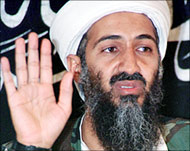Saudi: Top bin Ladin aide surrenders
Saudi Arabia has announced that a disabled fighter – suspected of being a top al-Qaida figure close to Usama bin Ladin – has surrendered under a royal amnesty.

“The wanted Saudi Khalid bin Udah bin Muhammad al-Harbi, alias Abu Sulaiman al-Makki, who had been in the Iranian-Afghan border region, contacted the embassy in Iran,” an interior ministry official said on Tuesday.
Al-Harbi said he wanted to take up the amnesty offer, and was flown to Saudi Arabia in coordination with Iranian authorities after the embassy prepared the necessary documents for him and his family, the official said.
“Since he is paralysed, he will be transferred directly to hospital to receive medical treatment,” he said.
Alleged al-Qaida fighter
Al-Harbi, a native of the holy city of Makka, is thought to have fought in Soviet-occupied Afghanistan alongside al-Qaida chief bin Ladin during the early 1980s.
Al-Harbi, who was wounded while fighting in Bosnia, taught courses in Islam at the Grand Mosque in Makka, Islam’s holiest site, but dropped out of sight after the 11 September attacks.
 |
|
Saudi-born bin Ladin is alleged to |
He is believed to have fled to Afghanistan via Iran at the time, and is alleged to have appeared alongside bin Ladin in a video aired by Aljazeera television in December 2001, during which he claimed that Muslim scholars “bless” the al-Qaida’s actions.
Saudi State TV showed al-Harbi, who is in his 40s, being carried down from a plane at Riyadh airport and put on a wheelchair. He was accompanied by a woman and a teenager. The official announcement suggests they were his wife and son.
Al-Harbi is only the third to surrender since the month-long amnesty was offered on 23 June, but does not figure on a most-wanted list of suspected Islamist dissidents, probably because he was not in the country.
Al-Harbi was shown on television saying he was well-received and praising the pardon granted by King Fahd to suspected al-Qaida members who turn themselves in within a month.
“This generous initiative undoubtedly offers a chance to any rational person” to return to the fold, he said.
Saudi Interior Minister Prince Nayif bin Abd al-Aziz said on Monday there would be no extension of the amnesty despite its poor results so far, although he expressed the hope that more suspects would come forward.